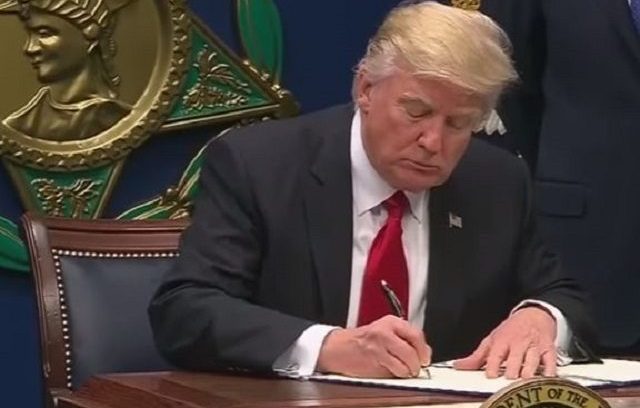 The Fourth Circuit Court of Appeals handed down a decision regarding President Donald Trump‘s second travel ban on Thursday, upholding a lower court’s preliminary injunction that blocks enforcement of the order nationwide. The main issue in the case pits two of the most significant national interests against each other. In the constitutional battle of the year, it’s national security vs. religious freedom.
The Fourth Circuit Court of Appeals handed down a decision regarding President Donald Trump‘s second travel ban on Thursday, upholding a lower court’s preliminary injunction that blocks enforcement of the order nationwide. The main issue in the case pits two of the most significant national interests against each other. In the constitutional battle of the year, it’s national security vs. religious freedom.
Chief Judge Roger Gregory wrote a very long, very thorough opinion that—despite its 100+ pages—somehow managed to leave out a pretty important detail: Travel Ban 2.0 is all about terrorism. Judge Gregory discussed the justifications, or lack thereof, for why the order bans travel from six specific countries that have Muslim-majority populations. Some of the reasons are better than others, for sure. Still, the very fact that it hand picked six Muslim-majority countries— out of 50 in the world—should be proof enough that while Trump may have spoken about a Muslim ban in the past, Travel Ban 2.0 is not a Muslim ban.
Yes, Donald Trump spoke about a Muslim ban during his campaign, and he wasn’t afraid to use the phrase “radical Islamic terror,” unlike his predecessor, but those comments made to appeal to voters don’t somehow give a travel ban he signed months later the intention of discriminating against people’s religious beliefs. Even when Trump talked about banning all Muslims, it was in the context of keeping terrorists out. A ban like that would have gone too far, for sure, because it would have been de facto religious discrimination even without a religiously-motivated intent, but again, that didn’t happen.
Now, you want to argue that the travel ban won’t be effective? I’ll listen to that. You want to say that it targeted the wrong countries, instead of ones that have a deeper history of contributing to terrorism? Sure. But poor reasoning and malicious reasoning are not the same, even if a federal judge wants to pretend otherwise.
Judge Gregory wrote that the travel ban “drips with religious intolerance, animus, and discrimination.” Nope. It drips with a zealous, albeit misguided desire to keep Americans safe.
Let’s remember, as long as we’re talking about Trump’s out of court statements, he just took a trip to Saudi Arabia, where he gave a speech that both called out Muslim countries by placing responsibility on them for driving out violent extremists, while at the same time peacefully reaching out to them and seeking peace for people of all religions. That should tell you where his head is.
Trump’s big problem is that he thinks about his intended result, while not spending nearly enough time on the process needed to achieve it. I get why people are upset about the travel ban. Americans with family in those six countries can’t have them come here to visit. That’s no small matter, and it raises legal questions. But when answering those questions, judges should look at all of the facts, and not pick and choose the ones that will get them to the outcome they want.
If you take into account all of Trump’s comments, from before and after the election, the true nature of the travel ban is pretty apparent. Like most of POTUS’ controversial acts, the travel ban was birthed from poor planning and execution, not malicious intent.
[Image via CBS screengrab]
This is an opinion piece. The views expressed in this article are those of just the author.